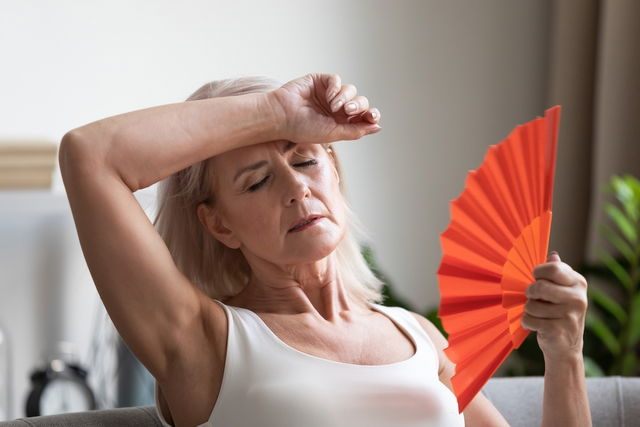Perimenopause is a life stage in which women transition from their reproductive period to a non-reproductive period. Perimenopause generally occurs 10 years before menopause, at around 45 years of age (although some women may start slightly before, at 42 years old).
Perimenopause occurs due to a progressive decrease in the production of female sex hormones. This leads to changes in a women’s body and symptoms similar to menopause.
Although it is not always necessary, treatment for perimenopause may involve birth control pills or an IUD to help manage specific symptoms.

Common symptoms
The most common symptoms of perimenopause are:
- Initially, a shortening of the menstrual cycle from 28 to 26 days
- This is followed by a longer duration between periods
- At some point, a very heavy flow may be noted
- Irritability
- Insomnia
- Decreased libido
- Decreased vaginal lubrication
The amount of estrogen produced by the ovaries starts to reduce between 30 and 40 years old. This causes the menstrual cycle to undergo changes that can be noted through some of the above symptoms.
How to know if you are entering menopause
If you suspect you may be experiencing menopause, enter your symptoms below to assess you risk:
What causes perimenopause?
Perimenopause is characterized by a decreased production of female sex hormones. This commonly occurs after 40 years of age, although there are factors that can speed up this process and lead to symptoms even before this age. Some factors that may influence earlier perimenopause include smoking, family history of an early onset, cancer treatments or surgical removal of the ovaries or uterus.
Confirming a diagnosis
Perimenopaused is diagnosed by a gynecologist through assessment of the presenting signs and symptoms, as well as an evaluation of blood test results. The doctor will likely test FSH levels on 2 or 3 different days. The higher this result, the more likely that the patient has entered perimenopause.
Treatment options
Treatment for perimenopause is not always necessary. However, women with moderate to severe symptoms may be prescribed a bith control pill or an IUD. These will help to prevent pregnancy and regulate menstruation before menopause starts.
Natural remedies
Natural treatment for perimenopause may involve:
- Drinking white baneberry tea every day
- Eating wild yams (Dioscorea paniculata) every day
This natural treatment can help to prevent significant hormone fluctuations, which can relieve symptoms. However, it is important to highlight that symptoms will progressively worsen over time, and that other symptoms, like hot flashes, headaches and restlessness. The gynecologist may prescribe hormonal replacement therapy in the meantime until symptoms start to stabilize.
To treat pre-menstrual syndrome (PMS), which tends to worsen during perimenopause, it is possible to take:
- Common evening primrose oil
- Chasteberry (Vitex agnus-castus L.,)
- Female ginseng (Angelica sinensis)
- Chromium and magnesium supplements
Exercising 30 minutes per day every day is also indicated to guarantee good muscle tone, strong bones and a stable weight. Aging is associated with decreased muscle volume, that is replaced with fat, which leads to a slower metabolism. This process may also influence perimenopause symptoms.
Perimenopause diet
With regards to what to eat, women with perimenopause should try to:
- Ingest flaxseeds in their daily diet
- Increase their calcium intake, which can be found in foods like soybeans, fish and vegetables
- Avoid foods that are high in caffeine, alcohol or fermentation
- Drink plenty of fluids
- Reduce fatty food intake
- Decrease refined sugar intake
These measures are important to prevent weight gain and to ensure symptom management.
It is important for women to also take note of certain beauty habits, as hair, nails and skin become dryer and more brittle. Women are advised to opt for keratin-based products and collagen supplements to ensure skin and joints remain healthy.
